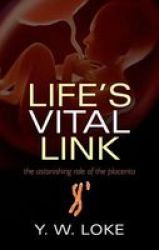Description
The development of the placenta was a pivotal event in evolution. The long and tortuous evolutionary road which led from egg-laying reptiles to present-day placental mammals like ourselves was an epic journey spanning over 300 million years. Without the placenta, we would still be laying eggs, instead of giving birth to live offspring.
In
Life's Vital Link, Y. W. Loke provides an engaging look at this remarkable organ, tracing the life of the placenta from the moment it is created within a fertilized egg, through its brief but eventful stay within the womb-usually around 270 days. Loke describes the basic gateway function of the placenta, telling how it actively encourages the passage of substances that are beneficial to the baby while barring those that are potentially harmful. It transfers oxygen and nutrients from mother to baby and returns carbon dioxide and waste products in the reverse direction, thereby acting as the baby's lungs, kidneys and digestive tract all at once. Loke also reveals other intriguing aspects of this organ. For instance, the placenta is genetically "foreign" to the mother, making it resemble an alien transplant in her womb. By rights, it should be rejected by the mother's immune system, but it is not-a mystery which, if solved, might help transplant patients avoid organ rejection. Loke also points out that, compared to other mammals, the human placenta is highly intrusive, penetrating deep into the lining of the mother's womb to obtain nutrients for the baby-highly invasive behavior that has caught the eye of oncologists, looking for clues into the invasive nature of cancer.
Life's Vital Link is the first book to give general readers an account of this remarkable organ, an ingenious instrument millions of years in the making.
